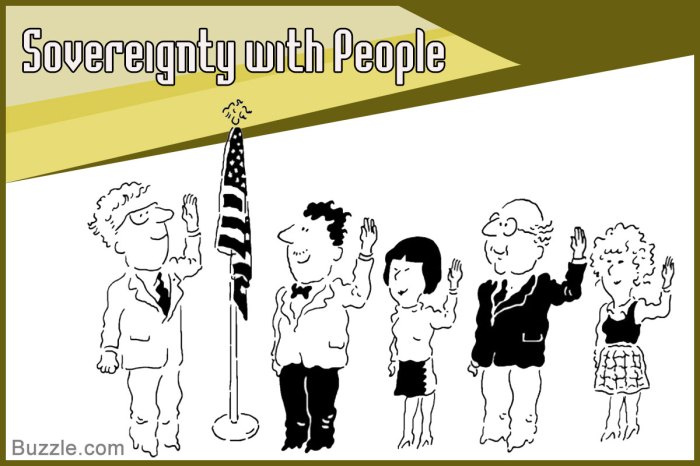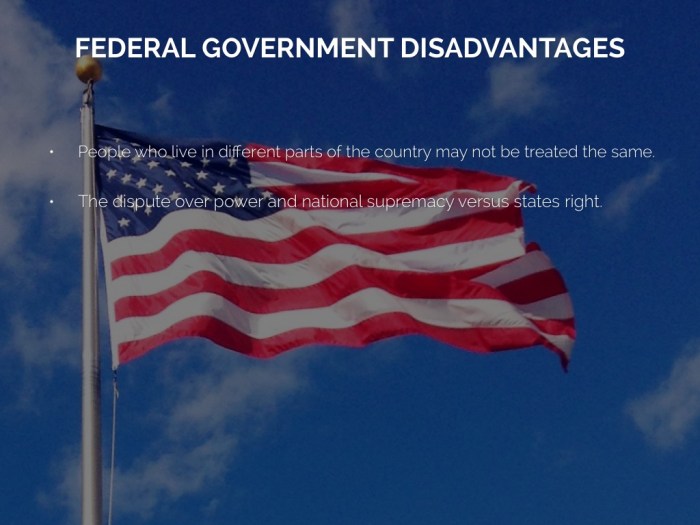Advantages and disadvantages of confederate government – The topic of confederate government, with its inherent advantages and disadvantages, has garnered significant attention in the realm of political science. This discourse delves into the intricacies of confederate systems, examining their benefits and drawbacks while providing historical examples and modern applications.
Advantages of Confederate Government

Confederate governments, characterized by loose alliances of independent states, offer several advantages:
Increased Autonomy and Flexibility
Member states retain significant autonomy, enabling them to tailor policies and regulations to meet their unique needs and circumstances. This flexibility fosters innovation and experimentation, allowing states to adapt quickly to changing conditions.
Historical Examples, Advantages and disadvantages of confederate government
Throughout history, confederate governments have proven successful in certain contexts. The Swiss Confederacy, established in 1291, is a notable example of a long-standing and stable confederation. The United States under the Articles of Confederation (1781-1789) also operated as a confederacy, providing valuable lessons on the potential benefits and challenges of such a system.
Disadvantages of Confederate Government

While confederate governments offer advantages, they also face potential drawbacks:
Weak Central Authority
Confederate governments typically have limited central authority, which can make it difficult to address issues that require coordinated action. Member states may prioritize their own interests over the collective good, leading to gridlock and inefficiency.
Challenges in Policy Coordination
Coordinating policies among independent states can be challenging, especially when interests diverge. Disputes over resource allocation, trade, or foreign policy can strain relations and undermine the stability of the confederation.
Risk of Secession
In extreme cases, member states may choose to secede from the confederation if they perceive their interests are not being adequately represented. Secession can lead to political instability, economic disruption, and even conflict.
Comparison of Confederate and Federal Systems

| Feature | Confederate System | Federal System |
|---|---|---|
| Power Distribution | Power primarily resides with member states | Power is divided between a central government and constituent states |
| Decision-Making Processes | Decisions made by consensus or majority vote of member states | Decisions made by a central legislative body, often with representation from constituent states |
| Fiscal Arrangements | Member states retain control over their own finances | Central government collects and allocates revenue among constituent states |
Advantages of Confederate Systems:Increased autonomy, flexibility, and potential for innovation. Advantages of Federal Systems:Stronger central authority, improved policy coordination, and reduced risk of secession.
Historical Examples of Confederate Governments

- Swiss Confederacy (1291-present)
- United States under the Articles of Confederation (1781-1789)
- Confederate States of America (1861-1865)
- Union of Soviet Socialist Republics (1922-1991)
- European Union (1993-present)
Modern Applications of Confederate Government: Advantages And Disadvantages Of Confederate Government
In the modern world, confederate-like arrangements have emerged in various forms:
- European Union:A political and economic union of 27 member states, characterized by shared institutions but significant autonomy for individual countries.
- North American Free Trade Agreement (NAFTA):A trilateral agreement between the United States, Canada, and Mexico that created a free trade zone.
- Association of Southeast Asian Nations (ASEAN):A regional organization of 10 Southeast Asian countries that promotes economic, political, and cultural cooperation.
General Inquiries
What is a confederate government?
A confederate government is a loose alliance of independent states that come together for specific purposes, such as defense or trade, while retaining their sovereignty.
What are the advantages of a confederate government?
Advantages include increased autonomy for member states, flexibility in decision-making, and the potential for greater cooperation on shared interests.
What are the disadvantages of a confederate government?
Disadvantages include weak central authority, challenges in coordinating policies, and the risk of secession by member states.